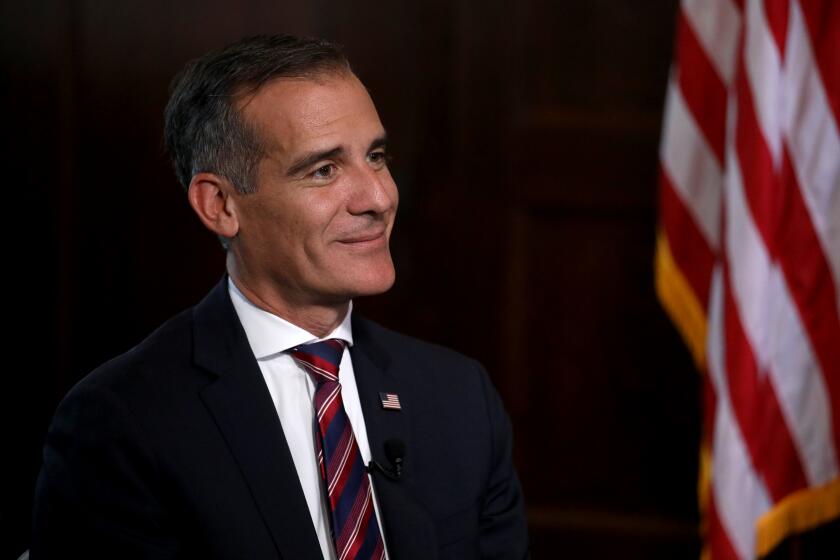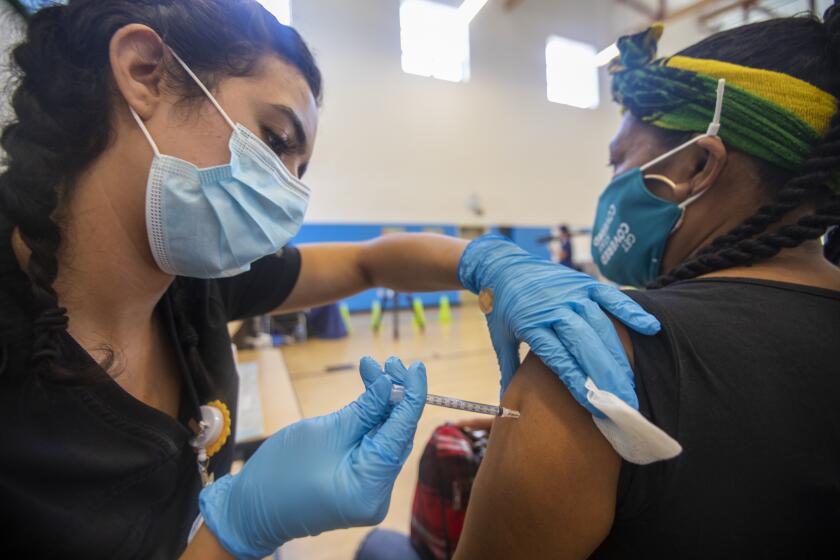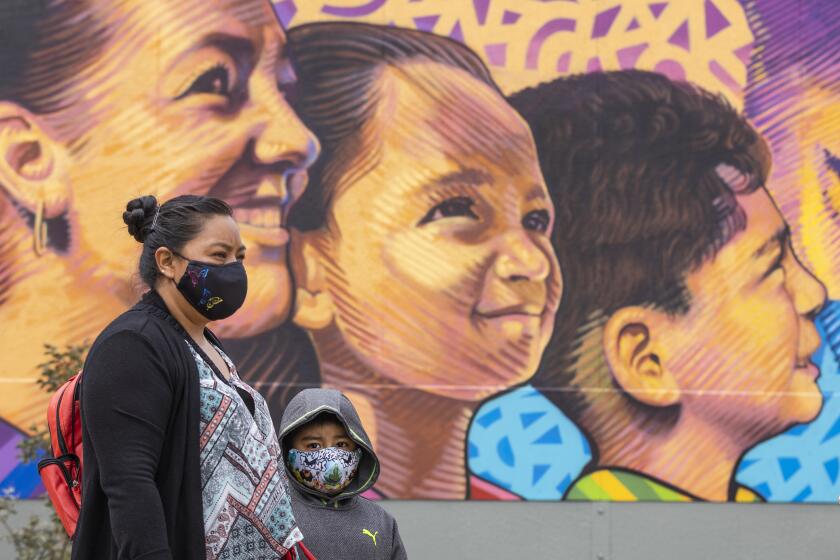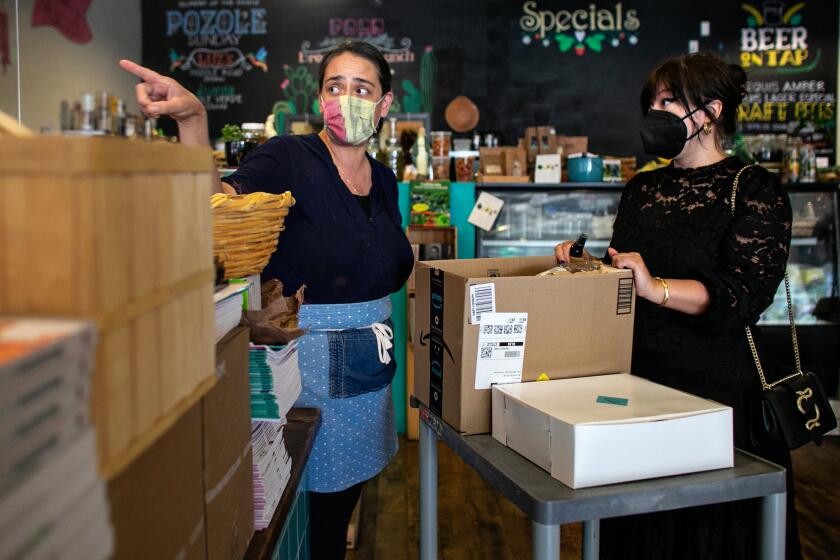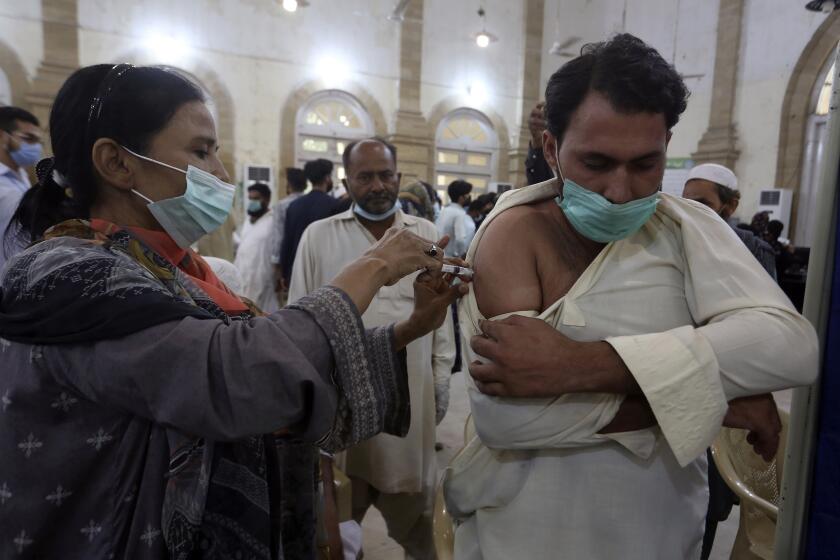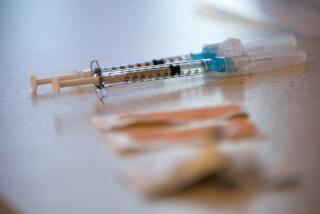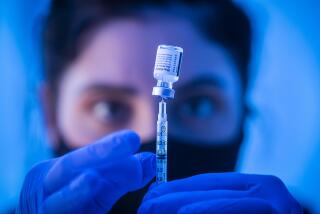L.A. will consider requiring vaccine proof at restaurants, gyms, indoor sporting events
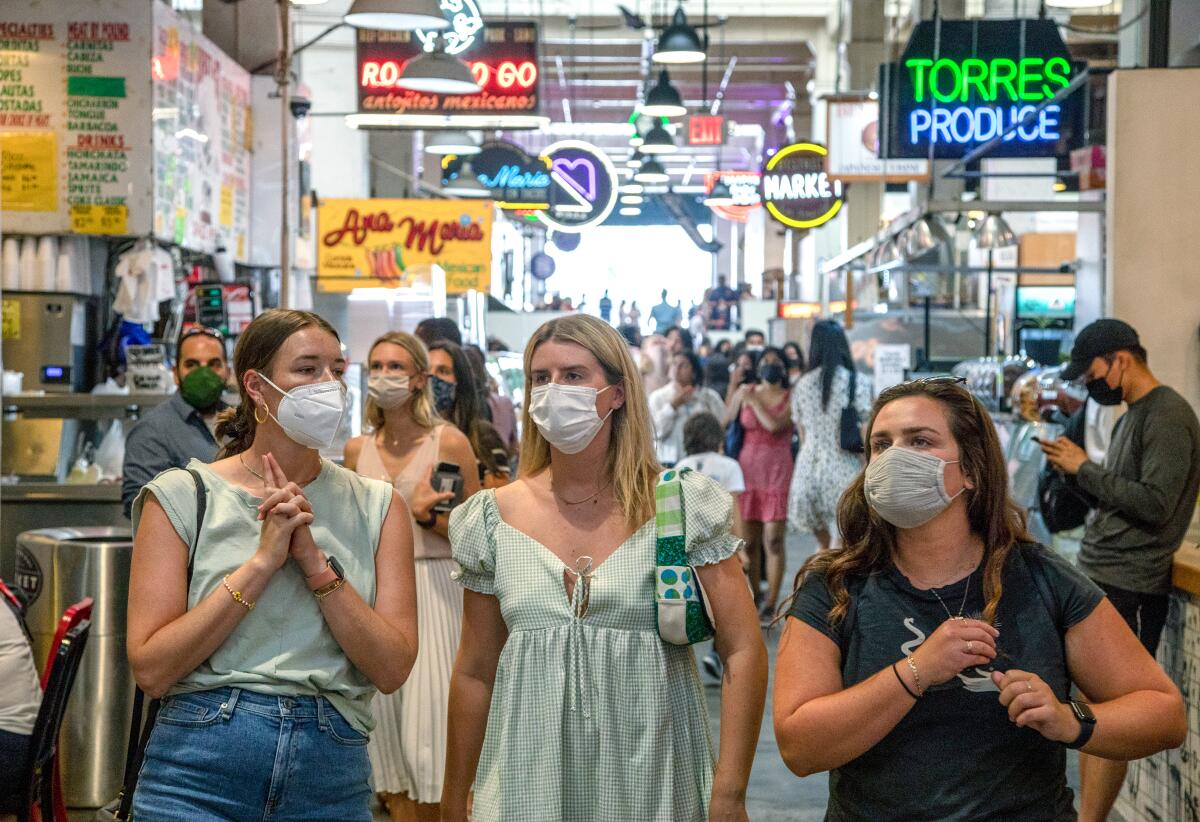
- Share via
With coronavirus cases continuing to rise, Los Angeles is now considering a proposal to require proof of COVID-19 inoculation as a condition of entry at a host of indoor public spaces in what, if passed, would be the widest-ranging vaccination-verification effort in the city yet.
The motion, introduced Wednesday by City Council President Nury Martinez and Councilman Mitch O’Farrell, would require eligible individuals to demonstrate that they’ve received at least one vaccination dose to visit indoor places such as restaurants, bars, retail stores, gyms, spas, movie theaters, stadiums and concert venues.
The move comes amid a surge in coronavirus cases fueled by the highly infectious Delta variant, which has both public officials and private businesses scrambling to slow the spread. Some L.A. restaurants have already begun requiring proof of vaccination for customers, saying they hope that action can forestall the more intense restrictions seen earlier in the pandemic that pushed some retailers to their breaking point.
A growing number of public agencies, private firms and universities are also imposing vaccination requirements. But the new proposal would expand the concept dramatically in L.A.
“Enough is enough already,” Martinez said in a statement. “Hospital workers are exhausted, moms who have put aside their careers are tired, and our kids cannot afford the loss of another school year. We have three vaccines that work and are readily available, so what’s it going to take? Our kids are about to return to school, and the unvaccinated are putting their lives at risk every day. Ask your questions, talk to your doctor and get the vaccine. Let’s put this behind us.”
L.A. will require city employees to provide proof of vaccination against COVID-19 or undergo weekly testing for the virus.
Some business leaders said the proposal would offer clarity and consistency, as well as some legal cover.
Stuart Waldman, president of the Valley Industry and Commerce Assn., said the new L.A. proposal “eliminates the piecemeal approach by providing uniformity and clarity.”
If the city, county or state imposes such a requirement, he said, it takes the onus off of individual businesses — and eases fears among small businesses about the legal risks of doing so themselves.
“Decisions need to be made in a uniform manner that impact businesses who have been working tirelessly to keep their employees and customers safe,” Waldman said.
The council motion will next head to the Ad Hoc Committee on COVID-19 Recovery and Neighborhood Investment, which consists of Martinez, O’Farrell and Councilmen Marqueece Harris-Dawson, Curren Price and Gil Cedillo.
Should the committee sign off, the motion would then go to the full 15-member City Council for consideration.
But it’s unclear how quickly any vaccine verification mandate could go into effect. If the council signs off, City Atty. Mike Feuer would still have to draft an ordinance codifying the requirement, which would come back to the council for approval.
The increase comes as a growing list of municipalities, businesses and venues are moving to require the shots for employees and, in some cases, customers.
It also remains to be seen how such a mandate could be reasonably enforced in a city the size of Los Angeles — one that has often fallen short in carrying out its stated rules.
L.A. City Councilman Joe Buscaino, who is running for mayor, said that “the rapid increase in cases means that we have to use every tool available to protect our neighbors and our economy.” However, the councilman said he was concerned about how the proposed mandate would be enforced.
Some have also questioned what it would mean for vaccinated parents who have children too young to get the shots. And Los Angeles is just one of the county’s 88 cities, which could lead to confusion for customers if there are differing rules for businesses inside and outside the city limits.
When asked about the motion, Alex Comisar, a spokesman for Mayor Eric Garcetti, said: “The mayor shares the sense of urgency to get more Angelenos vaccinated. He isn’t taking anything off the table, and is continuing to discuss this approach with our public health experts at the county.”
Risk factors are difficult to evaluate in school settings, but rising numbers are likely to raise concerns for some.
As of now, the L.A. County Department of Public Health is not requiring proof of vaccination for customers to enter specific businesses.
But in a statement, the department said it applauded the proposal for “assessing risks to their residents, businesses and customers, and adding additional layers of protection, including requiring proof of vaccination. We will be working with the Board of Supervisors, businesses and labor partners to explore all options for improving rates of vaccinations and promoting safety across all worksites and indoor spaces in L.A. County.”
The L.A. proposal comes a day after officials in New York City said they will require proof of inoculation status to enter gyms, indoor entertainment venues and restaurants starting later this month.
Almost immediately after that announcement, some politicians were pushing L.A. to plot a similar path. Feuer, who is also running for mayor, penned a letter that day urging county officials to follow New York’s lead.
L.A. County leaders will consider requiring employees to show proof of vaccination as Delta surges.
Already, more public agencies and private sector firms as well as retailers and restaurants are beginning to require proof of employees’ or patrons’ inoculation status. On Wednesday, L.A. County announced an executive order saying all county government employees must be fully vaccinated no later than Oct. 1, with exemptions for medical and religious reasons.
Christina Livingston, executive director of the community organization Alliance of Californians for Community Empowerment, welcomed the new proposal in L.A., saying that “low-income workers have been at the front lines through this entire pandemic and they have been the folks who have contracted COVID at the highest rates. What’s at stake is their lives.”
But “it’s entirely unrealistic to ask folks who are already subject to negative reactions from people who don’t want to mask or don’t want to be vaccinated to be the enforcers of the policy,” she added. “We’d have to figure that out.”
And should L.A. press forward with the plan, it will need to assess how it affects Black Angelenos and other groups that are less likely to be vaccinated and to ensure that it is not selectively enforced, said Michael Browning, director of public policy for the advocacy group Black Women Rally for Action - L.A. County.
“We don’t want this to be another reason for them to say, ‘You can’t get in,’ when they’re allowing other folks to get in,” Browning said.
Booster moratorium, or booster momentum? WHO chief’s call to ease vaccine disparity draws mixed response
Over the last week, Times data show, the county has reported an average of more than 2,800 new cases a day — six times the rate seen four weeks ago, though still well below the distressing heights of the fall-and-winter surge.
COVID-19 hospitalizations have also increased rapidly. On Tuesday, 1,279 coronavirus-positive patients were hospitalized countywide, a fourfold increase in just the last month.
Such steep increases in infection and illness, officials say, underscore the importance of getting people vaccinated as quickly as possible. Vaccinated people enjoy strong protection from even the Delta variant.
From July 25 to July 31, providers throughout California administered an average of nearly 44,000 first vaccine doses per day, according to data compiled by The Times.
That’s a 41% increase from two weeks ago, when the average was just under 31,100.
Those figures cover both those who received their initial dose of the Pfizer-BioNTech or Moderna vaccine and recipients of the single-shot Johnson & Johnson vaccine.
California’s vaccination pace still lags far behind its springtime peak, however. Over the week of April 4-10, providers administered an average of roughly 251,000 first doses per day.
Unvaccinated Angelenos continue to be infected with the coronavirus and fall seriously ill at significantly higher rates than their vaccinated counterparts — further evidence of the protective power the shots provide
At a vaccination clinic Wednesday on skid row, Christopher Harris said he was glad to get his second dose of the COVID-19 vaccine.
“I have no qualms about getting a shot to prevent something,” said Harris, who is unhoused, as he waited under the shade of the vaccination tent. When he was in the Navy and headed overseas, he said, “they gave us a gang of shots.”
But he had also taken note of the tightening rules for the unvaccinated.
“Things are going where you’re going to need that to get into places indoors,” Harris said of the COVID-19 shots. “They’re going to require you to have a record to get in.”
More to Read
Sign up for Essential California
The most important California stories and recommendations in your inbox every morning.
You may occasionally receive promotional content from the Los Angeles Times.
